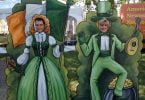
by Jill Ragar Esfeld
jill.esfeld@theleaven.org
From the time I was young, whenever I said the Lord’s Prayer, I wondered about the phrase: “Your will be done on earth as it is in heaven.”
What exactly did it mean?
In a college literature class I studied “The Psychomachia,” an allegorical poem written by Aurelius Prudentius in the early fifth century.
Suddenly, I had my answer.
In this medieval allegory, which is no easy read, Prudentius outlines an epic battle between good an evil — specifically the seven heavenly virtues fighting the seven deadly sins.
After studying the poem, I came to the conclusion that the virtues rule in heaven, as God’s will; but psychomachia — the battle of the soul — rages here on earth.
Anyway, I knew it raged in my personal life on a daily basis. And I figured if I am ever to be worthy of heaven, I’d better work on replacing my deadly sins with their corresponding virtues while I’m here on earth.
Lent is a great time to lend diligence to this project.
And so, each Lent, I make a daily habit of choosing one sin to concentrate on. And each time it pops up in my life — at any level or in any disguise — I try to replace it with its corresponding virtue.
Seven days in a week, seven sins and virtues; God has already done the math for me.
The Catechism of the Catholic Church refers to these sins as “capital sins” and here they are listed with their corresponding virtues, which you too can use to wage a battle for your soul this Lent.
- Pride, called the devil’s sin, is any desire to place yourself above others. It is conquered by the virtue of humility based in the realization that everything we have is from God, and anything we accomplish is by his grace.
- Greed is the desire for material possessions and worldly power. It blocks our vision of spiritual goods. Fight greed with the virtue of charity. Sharing your time, talent and treasure with those in need puts you in touch with the face of Christ.
- Envy goes beyond jealousy in its feeling of disappointment in another’s good fortune. Conquer envy with the virtue of kindness, practicing intentional goodwill and admiration toward your neighbor’s possessions, accomplishments and blessings.
- Wrath or anger is often the result of impatience and lack of understanding. At its worst, wrath desires revenge. If you feel wrath, practice the virtue of patience with forgiveness, and work at having compassionate understanding for the person who has angered you.
- Lust involves taking part in any action that diminishes the holiness of life. It can be overcome with the virtue of chastity. Through purity of thought and intention we are constantly mindful that all bodies are temples of the Holy Spirit.
- Gluttony is an over-indulgence in anything — from food and alcohol to television and cell phones. It can be conquered with the virtue of temperance by practicing self-restraint and moderation in the enjoyment of God’s bounty.
- Sloth, beyond being lazy, is apathy toward the world around us which God entrusted to our care. Sloth is battled by the virtue of diligence — making a commitment to improve our work ethic, budget our time, and be zealous in our efforts to care for God’s creation.
The battle of the soul will always be with us on earth. But if we make a good effort to win the war during Lent, it may become a habit for the rest of the year.
And when we are finally called to paradise, God will find us ready for our new life there.







We can never be worthy of ourselves. ”
“All our righteousness is as filthy rags. says the Bible..”Not by works of righteousness which we have done, but according to His mercy hath He saved us” .. “Though your sins be as scarlet you will be white as snow”… This is what is meant by being washed in the blood…saved..now and forever and “no one can pluck them from My hand”